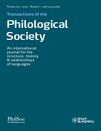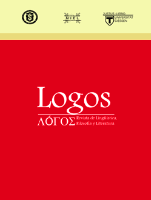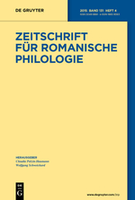
LINGUA E STILE
Scope & Guideline
Engaging with Contemporary Debates in Linguistic Theory
Introduction
Aims and Scopes
- Historical Linguistics and Philology:
A core focus on the historical development of the Italian language, examining texts from different periods and their linguistic features. - Cultural and Societal Linguistics:
Exploring how language reflects and shapes cultural identities, societal changes, and historical contexts, particularly in relation to Italian heritage. - Linguistic Variation and Dialects:
Investigating the diversity within the Italian language, including regional dialects and their evolution over time. - Language and Literature:
Analyzing the relationship between language and literary expression, including stylistic studies of notable Italian authors and texts. - Contemporary Language Usage:
Examining modern linguistic phenomena, such as neologisms and the impact of digital communication on the Italian language.
Trending and Emerging
- Language and Technology:
An increasing focus on the impact of technology on the Italian language, including studies on digital communication, memes, and the evolution of language in online contexts. - Sociolinguistics and Language Policy:
Emerging themes related to linguistic insecurity, code-switching, and the sociolinguistic dynamics of multilingualism reflect a growing interest in how language functions in diverse communities. - Language and Food Culture:
The intersection of language studies with culinary discourse is gaining traction, highlighting how food-related language contributes to cultural identity and social practices. - Interdisciplinary Approaches:
There is a notable trend towards interdisciplinary research that combines linguistic analysis with fields such as history, politics, and cultural studies, indicating a broader contextual understanding of language.
Declining or Waning
- Traditional Grammar Studies:
There has been a noticeable decrease in research focused on traditional grammar frameworks, as contemporary studies increasingly prioritize sociolinguistic and pragmatic approaches. - Historical Text Editions:
Although historical texts remain important, the frequency of publications centered solely on the editing and annotation of older texts has diminished, possibly due to a shift towards interdisciplinary studies. - Static Language Descriptions:
Research that emphasizes static descriptions of language without considering socio-cultural dynamics appears to be waning, as the field moves towards more dynamic and contextual analyses.
Similar Journals

TRANSACTIONS OF THE PHILOLOGICAL SOCIETY
Fostering Innovation in Linguistic ResearchTRANSACTIONS OF THE PHILOLOGICAL SOCIETY, published by Wiley, is a prestigious journal focusing on the fields of linguistics and language studies. With a rich history that spans over 180 years, having been established in 1842, this journal continues to contribute significantly to the academic discourse on language and linguistics. It holds an impressive impact factor and ranks in the Q2 category for both Linguistics and Language in the 2023 category quartiles, underscoring its relevance and scholarly influence, as evidenced by its rankings in the Scopus database. Researchers, professionals, and students will find this journal invaluable for accessing high-quality research articles that illuminate various aspects of language and linguistics. While the journal does not currently offer open access, it remains a vital resource for anyone dedicated to advancing knowledge in these fields. Its address in the United Kingdom underscores its international reach and commitment to academic excellence.

Sibirskii Filologicheskii Zhurnal
Cultivating Knowledge in Cultural Studies and LinguisticsSibirskii Filologicheskii Zhurnal is a prestigious academic journal published by the Russian Academy of Sciences, Institute of Cytology and Genetics. With ISSN 1813-7083, it is dedicated to advancing research in the fields of Cultural Studies, Linguistics and Language, and Literature and Literary Theory, and has achieved notable rankings, including Q2 in Cultural Studies and Linguistics, and Q1 in Literature for 2023. The journal provides a platform for scholarly discourse, contributing valuable insights to its fields with an evolving scope that spans from 2018 to 2024. Though not an open-access journal, Sibirskii Filologicheskii Zhurnal serves as a vital resource for researchers, professionals, and students in the Russian Federation and beyond, fostering a deeper understanding of linguistic and literary phenomena. Its commitment to high-quality content makes it an essential addition to any academic's library.

Logos-Revista de Linguistica Filosofia y Literatura
Exploring the Intersection of Language, Thought, and NarrativeLogos-Revista de Linguistica Filosofia y Literatura, published by UNIV SERENA, FAC HUMANIDADES in Chile, stands as a distinguished academic journal dedicated to the fields of linguistics, philosophy, and literature. With an ISSN of 0716-7520 and an E-ISSN of 0719-3262, this Open Access journal has been facilitating the dissemination of innovative research since 2012. Notably recognized within the Q2 category for Linguistics and Language, the Q1 category for Literature and Literary Theory, and another Q2 in Philosophy for 2023, it reflects a robust commitment to intellectual rigor and scholarly impact. The journal's rankings in Scopus highlight its significance in the Arts and Humanities' landscape, with impressive percentiles in multiple categories, affirming its vital role in advancing academic discourse. Serving as a crucial platform for researchers, professionals, and students, Logos encourages interdisciplinary dialogue and exploration, thereby enriching the understanding of language, thought, and narrative. The publication's convergence of diverse academic traditions and progressive themes positions it as a pivotal resource for contemporary scholarship.

LINGUISTIQUE
Bridging Gaps in Linguistic UnderstandingLINGUISTIQUE, an esteemed journal published by PRESSES UNIV FRANCE, serves as a vital platform for scholarly discourse in the fields of linguistics and language studies. With its ISSN 0075-966X and E-ISSN 2101-0234, this French journal has been a significant contributor to the understanding of linguistic phenomena since its inception in 2004, and it continues its journey through to 2024. Although currently categorized in the Q4 quartile for both Arts and Humanities (miscellaneous) and Linguistics and Language, its commitment to publishing quality research encourages a diverse range of articles, reviews, and innovative studies. Positioned in the 32nd and 29th percentiles for its respective fields according to Scopus rankings, LINGUISTIQUE is dedicated to advancing knowledge and stimulating engagement among researchers, professionals, and students alike. While it does not offer open access, the journal remains an essential resource for those who seek to deepen their understanding of linguistic principles in a global context, facilitating a richer discourse that connects theory with practice.

Studia z Filologii Polskiej i Slowianskiej
Illuminating the Nuances of Slavic LanguagesStudia z Filologii Polskiej i Slowianskiej is a prominent journal published by the Polish Academy of Sciences, Institute of Slavic Studies, focusing on the rich and diverse field of linguistics and language studies, particularly within the Slavic context. With the ISSN 0081-7090 and E-ISSN 2392-2435, this open-access journal has been a valuable resource for researchers, professionals, and students since its transition to an open-access model in 2014. It features rigorous peer-reviewed articles that contribute to the understanding of linguistic phenomena and cultural narratives across Slavic languages. Recognized within the Q3 quartile of linguistics and language in 2023, it ranks at the intersection of arts, humanities, and social sciences, providing insights that echo through disciplines such as sociolinguistics, psycholinguistics, and philology. In its ongoing publication trajectory from 2011 to 2023, Studia z Filologii Polskiej i Slowianskiej continues to foster academic discourse and collaboration, positioning itself as a key player in the global linguistic community.

Studia Universitatis Babes-Bolyai Philologia
Exploring the Depths of Philological ScholarshipWelcome to Studia Universitatis Babes-Bolyai Philologia, a distinguished journal published by UNIV BABES-BOLYAI, which has proudly embraced Open Access since 2021. With an ISSN of 1220-0484 and an E-ISSN of 2065-9652, this journal serves as a vital platform for scholars in the field of philology, offering a rich repository of contemporary research and innovative thought. Hailing from the vibrant academic community of Cluj-Napoca, Romania, the journal aims to foster interdisciplinary dialogue and promote cutting-edge studies that explore linguistic, literary, and cultural dynamics across the globe. By providing unrestricted access to its content, Studia Universitatis Babes-Bolyai Philologia ensures that vital research is available to a worldwide audience, empowering researchers, professionals, and students to engage with and contribute to the ever-evolving discourse in philological studies.

Dacoromania
Bridging ideas and cultures through language and literature.Dacoromania, published by the esteemed EDITURA ACAD ROMANE, is an Open Access academic journal that has been contributing to the fields of Linguistics, Language, Literature, and Literary Theory since 2011. With a mission to foster scholarly dialogue and facilitate knowledge dissemination, the journal enables researchers, professionals, and students to access a wealth of innovative research and critical scholarship without barriers. Although currently classified in the Q4 quartile for its categories in Linguistics and Literature, Dacoromania aspires to enhance its visibility and impact within these disciplines, providing a platform for emerging voices and ideas from Romania and beyond. The journal is openly accessible and invites submissions that push the boundaries of linguistic and literary studies, ensuring a vibrant exchange of thought in a rapidly evolving academic landscape.

Sprache & Sprachen
Innovating Perspectives on Language UsageSprache & Sprachen is a renowned academic journal published by the Gesellschaft Sprache & Sprachen Gesus EV, focusing on the dynamic field of linguistics and language studies. With an ISSN of 0934-6813 and an E-ISSN of 2199-6016, this journal serves as a valuable platform for researchers and scholars to share innovative research, theoretical frameworks, and empirical studies related to language usage, structure, and evolution. Though it currently does not operate under an Open Access model, it maintains a robust reputation within the academic community, contributing significantly to ongoing discussions in linguistics. The journal's objective is to foster interdisciplinary collaboration and provide a forum for diverse linguistic perspectives, making it an essential resource for professionals and students alike who are keen on advancing their understanding of language phenomena. Located in Wuppertal, Germany, Sprache & Sprachen aims to engage the global academic audience by disseminating critical insights and encouraging scholarly discourse.

LINGUA NOSTRA
Fostering innovation in linguistic research.LINGUA NOSTRA, an esteemed journal published by CASA EDITRICE G C SANSONI SPA, has been a notable contributor to the field of linguistics since its inception in 1968. With an ISSN of 0024-3868, this journal is dedicated to advancing knowledge and research in linguistics and language studies. Despite its current Q4 category ranking in both the Linguistics and Language fields, and its Scopus ranking placing it in the lower percentiles, LINGUA NOSTRA remains a valuable resource for emerging and established scholars alike, offering insights into various linguistic phenomena. The journal publishes original research, reviews, and theoretical works that stimulate discourse in linguistic practices and methodologies. Based in Florence, Italy, this journal is not open access but continues to be a crucial platform for linguistic inquiry and findings, bridging historical and contemporary linguistic theories as it converges over the decades.

ZEITSCHRIFT FUR ROMANISCHE PHILOLOGIE
Fostering Academic Dialogue in the Heart of BerlinZEITSCHRIFT FUR ROMANISCHE PHILOLOGIE, published by Walter de Gruyter GmbH, stands as a prominent peer-reviewed journal dedicated to the fields of Linguistics, Literature, and Literary Theory. Established in 1877 and continuing its legacy to the present day, this esteemed journal offers a platform for comprehensive scholarship that explores the intricacies of Romance languages and their literary heritage. With a notable Q1 ranking in Literature and Literary Theory and a Q2 ranking in Linguistics and Language, it has secured its place among leading resources in the humanities. Researchers, educators, and students benefit from its rich historical context and current contributions to the understanding of Romance languages and literature. Though currently not available as Open Access, the journal prioritizes the dissemination of high-quality research, making significant strides in fostering academic dialogue and advancement. Its address at Genthiner Straße 13, Berlin, Germany, situates it in a hub of scholarly activity, bridging the past with contemporary literary discourse.